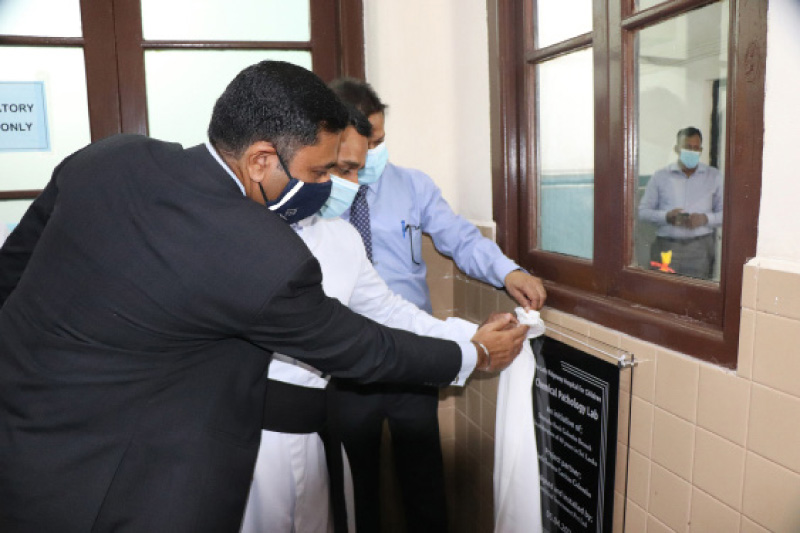Friday Feb 20, 2026
Friday Feb 20, 2026
Friday, 4 June 2021 02:18 - - {{hitsCtrl.values.hits}}

Deutsche Bank Sri Lanka and Sethsarana Caritas are pleased to announce the successful completion and opening of a new biochemistry laboratory at the Lady Ridgeway Hospital for Children, the largest free paediatric hospital in Sri Lanka.
The new laboratory, developed by Sethsarana Caritas and funded by Deutsche Bank, aims to improve the efficiency of critical testing procedures as the hospital prepares to begin bone marrow transplant to treat childhood leukaemia. It will be the first government hospital to offer this treatment.
Deutsche Bank Chief Country Officer Vikas Arora said, “This new biochemistry laboratory is part of the critical hospital infrastructure that Lady Ridgeway needs in order to offer essential treatment for very ill Sri Lankan children.
“We undertook this project last year as part of our 40th anniversary commitments in Sri Lanka, then responding to the COVID-19 pandemic became the urgent priority. We are pleased to see the lab open and begin operating this year,” Arora added.
The Lady Ridgeway laboratory is the latest collaboration between Caritas and Deutsche Bank, which have partnered for over a decade bringing essential care to Sri Lankans in need.
At the completion of this valuable and timely project, Seth Sarana Colombo Director Rev. Fr. Ramanayake said: “We very much appreciate the trust and confidence placed on our Institution in responding to the needs of our time and those who constantly kept in touch with us representing Deutsche Bank in Sri Lanka. We will continue to pray for the benefactors and customers who have supported this CSR Project.”
LRH Director Dr. G. Wijesuriya mentioned that the facility improvement will be a blessing for the children. “The hospital serves as the nation’s child care hospital and we undertake pathology, haematology tests across the country. This improvement will definitely help us to improve our service to the country, qualitatively and quantitatively.” He also mentioned the support received from the technological partner Analytical Instruments Ltd. in completion of the laboratory setup.
Last year the bank completed 40 years in Sri Lanka and executed several projects to assist in COVID-related relief measures. The bank partnered with John Keells Foundation to establish a molecular virology laboratory at the National Institute of Infectious Diseases of Sri Lanka to increase testing capacity to combat COVID-19.
The bank’s relief efforts with Caritas for the pandemic helped vulnerable families across many districts who were in desperate need of essential food, targeting the most marginalised segments of the community to receive this support – single mothers with young school-going children, young widows with children, low-income families with disabled members, and the elderly. Deutsche Bank funded 3,200 food packs, which contained rice, flour, dhal, sugar, tea leaves, milk powder, coconut, noodles, chili powder, soya, as well as face masks, hand sanitiser, and soap.
In addition, Deutsche Bank funded personal protection equipment kits for intellectually disabled children and COVID relief food packs for many families as the pandemic shuts down the economy and people’s livelihoods.
Finally, 60 Deutsche Bank employees in Sri Lanka took more than 15 million steps over 40 days, the equivalent of each staff member walking six kilometres per day to fundraise for the needy as part of the bank’s global ‘Steps Challenge’.
Over the past decade, Deutsche Bank has contributed EUR 300,000 (Rs. 70 million) and continues to support the Sri Lankan community with health and education initiatives. For example, the bank has run annual eye camps to provide free screening and treatment for rural communities, directly impacting more than 10,000 individuals till date.
Deutsche Bank’s corporate social responsibility initiatives support the UN’s Sustainable Development Goals; #1 No Poverty, #2 Zero Hunger, #3 Good health and well-being, #4 Quality Education, #5 Gender Equality, #6 Clean water and sanitation and #11 Sustainable cities and communities.